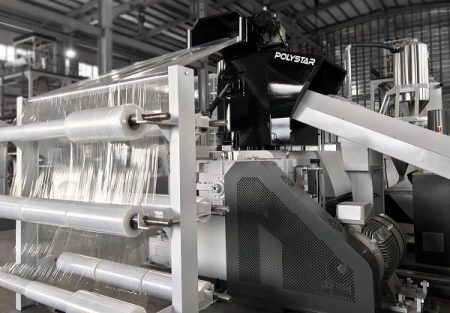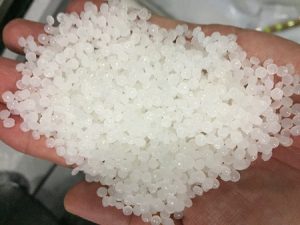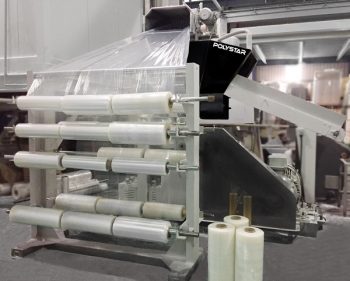 As the largest LLDPE stretch and PE cling film producer in Taiwan with monthly production of 3,000 tons (achieved with several 5-layer cast film machines from Germany), in-house recycling is valued highly by the 30-year-old film producer as part of the production process to ensure quality and consistency in the end product remain high.
As the largest LLDPE stretch and PE cling film producer in Taiwan with monthly production of 3,000 tons (achieved with several 5-layer cast film machines from Germany), in-house recycling is valued highly by the 30-year-old film producer as part of the production process to ensure quality and consistency in the end product remain high.
Ever since the company’s major expansion in 1991, it has been carefully selecting only the best and world-class machine manufacturers in the market as its partners. The company was the first Taiwanese film producer to bring in a five layer casting extruder from Germany and is now equipped with several multi-layer cast film and printing machines from Europe.
In 2016, the film producer has opted for the “POLYSTAR” recycling line to process its in-house waste generated from the extrusion lines.The POLYSTAR line was in fact the first equipment that the producer has ever purchased from an Asian manufacturer. Sharing his experience on the decision making process, the CEO was particularly impressed after seeing the trial runs at POLYSTAR’s facility,mainly for the following reasons:
- Simple operation and maintenance –
The increase in labor and logistics cost in Taiwan has become more difficult for Taiwanese plastic producers to stay competitive. Therefore making sure that minimal labor intervention on the machine is crucial.
- Consistency and quality in the recycled pellets–
The consistency in quality(uniform in size, reusability, minimal property change and degradation) of the recycled pellets can ensure that the recycled material can be reused again in the extrusion machines to produce high-end film product with the highest possible quality.
The POLYSTAR recycling machine is now running 24 hours a day and 7 days a week in the factory of the ISO 9002 certified film producer,with an average production of 250~300kg/hr with little operator intervention, setting another great example of effective and valuable in-house recycling.
The defected film-on-rolls are fed automatically via the nip rolls on top of the cutter-compactor, which is then compacted and fed directly into the recycling extruder for further processing and pelletizing. The rest of the occasionally generated scraps are fed via the conveyor belt. The two-way feedings are controlled automatically and simultaneously to prevent over-feeding or insufficient feeding of material into the machine.
Despite the difference and variation in film width, thickness, layer structure (mono, three and five layers), the machine can handle all these film scraps of different compositions with consistency and still produce high quality and uniform-sized pellets, which are then put immediately back into the cast and stretch film lines.
“The built quality of the POLYSTAR recycling machine as well as the product (recycled pellets) quality meet our high standards, commented the production manager of the film manufacturer during a visit from POLYSTAR to check up on the user experience after several months of operating the machine. “The level of automation and intelligent control is up there and the operation is so simple.”
The design of POLYSTAR recycling machine is also very compact and takes up very little space. “This was important for us because we had space limitation and we needed a machine that could fit right next to our stretch film line,” he added.

The company “WEBSITE“












